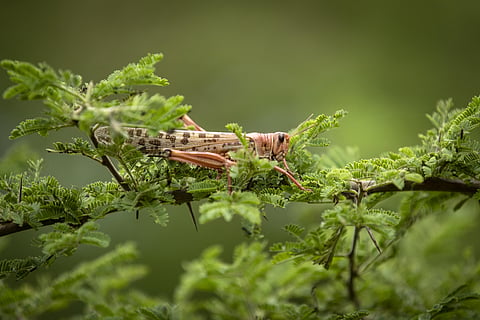

NEW DELHI: As the country faces the worst ever desert locust outbreak in three decades, a farm expert has said the government is just focusing on chemical spray on the migratory pest, ignoring other natural methods for controlling the menace.
Presently, locusts have affected five states -- Rajasthan, Gujarat, Madhya Pradesh, Uttar Pradesh and Maharashtra -- and the Centre has issued a warning to the border-sharing states.
The Centre has plans to step up aerial spray using drones and helicopters.
"Despite the known side effects of aerial spraying of pesticides, the government's locust control policy is focussed on chemical spray only and other non-chemical measures are being completely ignored," Haryana-based Kudrati Kheti Abhiyan Advisor Rajinder Chaudhary said in a statement.
There is no doubt that the locust attack is a menace that cannot be ignored, but along with locust control, it must also be ensured that the control measures do not pollute air, water, environment and food chain, he said.
A representation has been made in this regard to the agriculture ministry.
To control locusts without side effects, a number of effective non-chemical remedies have been suggested by experts from India and abroad, including by Padma Shri awardee Chintala Venkata Reddy, an organic farmer from Telangana, he said.
Chintala has shared safe and effective measures with the government for control of locusts through biological and non-chemical methods, he said.
"If chemical methods cannot be junked all together, then at least in the areas near the population and close to catchment/storage areas of water bodies, Government must adopt the safer non-chemical measures instead of adopting chemical measures," Chaudhary said.
Listing out some of the non-chemical measures, he said locusts, which do not travel or eat during night, can be collected and used as poultry feed.
Economic and physical feasibility of this method has been established.
A person can catch up to 10 quintals of locust in a night and use them as poultry and duck feed, thereby helping control locusts, he said.
Another way to control locusts within 24 hours is by spraying a concoction of linseed oil, edible soda/sodium bicarbonate and extracts of garlic, cumin and orange.
This mixture also has no side effects on crops.
Timely measures can be taken by understanding the cycle of locusts and one can use available parasitic fungi that can kill locusts, he added.
That apart, locusts can also be controlled by spraying with anything that makes the vegetative matter inedible.
Chintala has suggested taking 30-40 kg of sub-soil from four feet below the earth and dissolving it well in 200 litres of water and allowing it to rest for 10-20 minutes.
The sieved water should be then filtered and sprayed on the crops. This will make all the vegetation inedible for locusts. This sand-water can be sprayed with a normal spray pump.
After the locust threat is over, spraying the crop with plain water will remove the sand layer from the leaves. He also said making noise, placing 50-foot high traps on the way of swarm of locusts or flying airplanes through the swarm or scattering them by any other way can avert major damage.